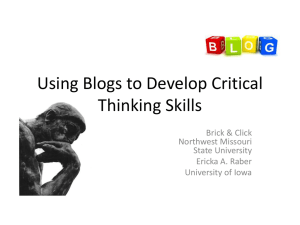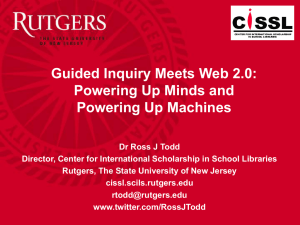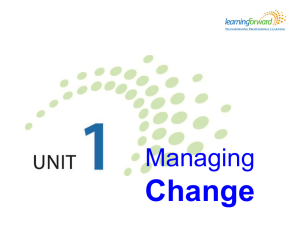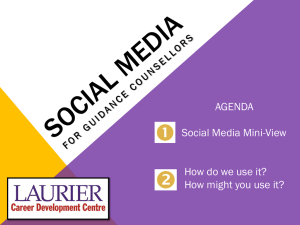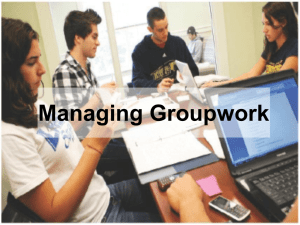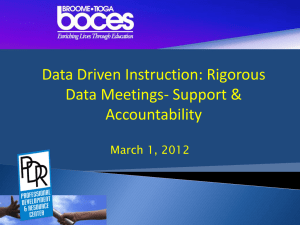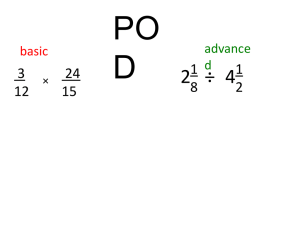Evaluating Source and Search Online
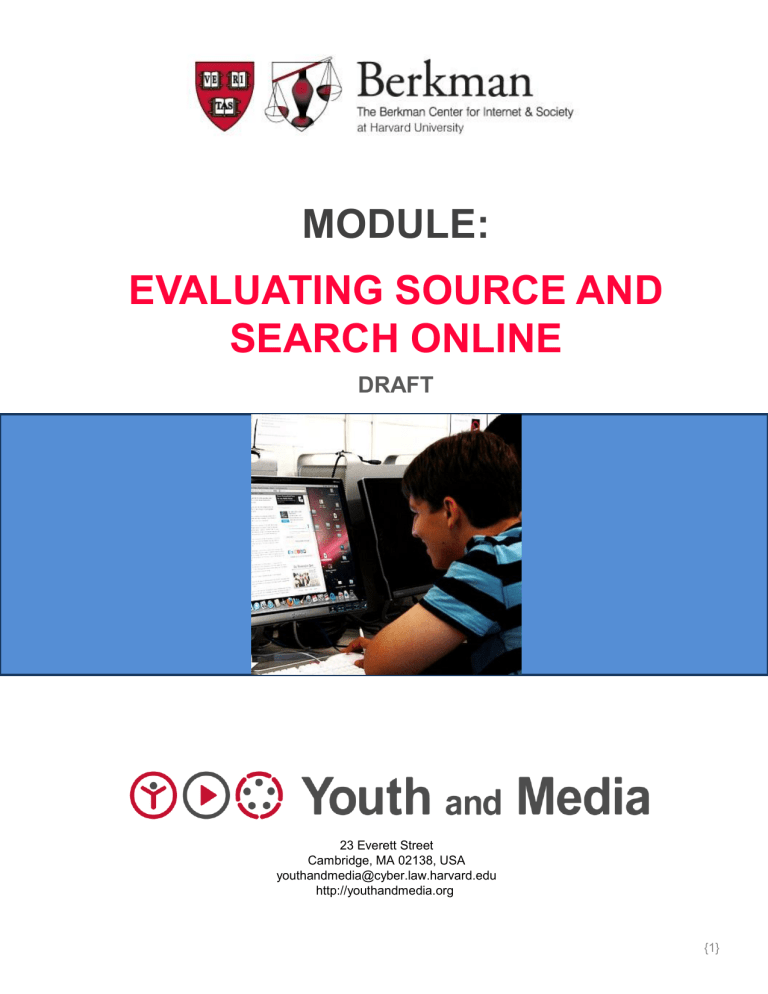
MODULE:
EVALUATING SOURCE AND
SEARCH ONLINE
DRAFT
23 Everett Street
Cambridge, MA 02138, USA youthandmedia@cyber.law.harvard.edu
http://youthandmedia.org
{1}
Overview
News media is frequently filled with reports whose details are later disputed, dismissed, or proven false. In this workshop, participants will embark upon a search for information about the “Gay Girl in
Damascus,” practicing and exploring their own search and evaluation skills, while considering the wide variety of sources of information online.
Objectives
Participants will be able to:
• Understand the importance of comparing multiple sources when researching a story/event.
• Gain insight into how a story develops over time.
• Develop an awareness of their own attitudes towards different online sources
• Recognize that these various attitudes towards different online sources can affect the decision to choose certain sources over others
Age/Grade
14-16 years old
Grades 9-12
Note: This module can be modified for a wider range of ages.
Audience
Entry level and up (basic web searching skills necessary)
Duration
75 minutes
• Sources of Information (15 minutes)
• Web Quest (45 minutes)
• Closure: (15 minutes)
Materials
• Computers with internet access and web browsers (enough for students to pair off in groups of 2-3)
• Paper/pencils
• Whiteboard/whiteboard markers
Sources of Information
(10 minutes)
Note
: For the purposes of this activity, it is particularly helpful if the facilitator is familiar with at least one recent news story that relates to the students.
Goal
: To introduce participants to the workshop topic.
Materials:
whiteboard, markers
Say:
Today, we’re going to talk about the ways in which you search for information online, how you learn about news stories, and how you evaluate different sources of information. For example, when you want to learn about a current event or something in the news, where do you go? What sources of information do you check?
[Make a list on the board with the sources of information that students mention. For example: newspapers, TV shows, the radio, news websites, Facebook, Twitter, etc.
Ensure that blogs are mentioned as a source. If they are not, introduce the term. Be sure to spend some time defining what a blog is, as compared to a newspaper. The definitions of both are provided below for reference.]
A blog (a blend of the terms
“web” and “log”) is a type of website, or a part of a website. Blogs are usually maintained by an individual person, with regular entries, or posts. These posts can include descriptions of events, commentary on those events, and/or other material, like pictures, art, or video.
Usually, bloggers write about a lot of personal topics. How is this different from the way that a newspaper works?
A newspaper is a “regularly scheduled publication containing news of current events, informative articles, diverse features, and advertising” (Wikipedia). News content is reported by journalists and edited by a single person or a group of professionals.
Say:
• Of the sources on the board, which ones do you use to stay informed about current events?
• Do you read blogs? Which ones?
• Why do you use a blog as a source of information?
• How do you know you can trust source X? Why do you use it?
• Does anyone have an example of a news story they heard recently? What was it about? How did you hear about it? Did you read about it once, or did you follow what happened in the story?
Web Quest
(30 minutes)
Note
: Facilitators should familiarize themselves with the background reading on the “Gay Girl in
Damascus” hoax. Additionally, the questions below are meant to only be read out loud , to mimic the search process (not knowing how to spell names, etc).
Goal
: For participants to practice their search and evaluation skills, exploring the concept of different sources of information.
Materials:
Computers, Hoax Questions Handout, Search Queries Handout, Timeline Handout
[Separate participants into groups of two-three and assign them to computers. Give each group the search query handout.]
Say:
We just talked about a lot of different ways to find information, whether online or out in the world.
Let’s imagine that on June 10, 2011, your best friend comes up to you and tells you that she heard that a famous Syrian-American blogger was abducted a few days ago. How can you find out more? What is the name and gender of of the blogger? What else can you learn about them?
As you go online to search, use this handout to keep track of how you searched.
• Which keywords did you use? (What words did you put into the search engine to look up information?)
• Which webpages did you visit? What sources did you use?
• Why did you choose certain sources over others?
[As individual groups finish each part, hand them the next question so that they can work at their own pace. Also, ask students from groups who finish early to put their information up at the whiteboard.]
• What happened to the Syrian blogger’s father? What steps did the blogger take to look out for his/her own safety and security, if they took any at all?
• Who is Rania Ismail? What can you find out about this person?
Before we discuss the answers to these questions, can anyone give us a brief summary of what they found? What was the news story about?
[Students tell their version of the story. If they did not find that the story was a hoax, facilitator can tell a brief summary of the story.]
[Hand out timeline. During this discussion, ensure that students understand that the story developed over a period of time. ]
[Goal: For students to understand that Mr. MacMaster hoped to provide insight into the events unfolding in Syria through a certain perspective not often told in America.]
Say:
Here is a chronological timeline of the story as it unfolded. Does anything surprise you?
• What were some of the key terms that you used to figure things out? Sources?
• How do those keywords and sources relate to events on the timeline? What else do you notice?
• At first, newspapers believed the story that this blogger wrote. How do you think people discovered that this was a hoax?
Who do you think figured this out?
• As the story developed, newspapers adjusted their information. If this kind of story had happened before the internet, do you think the person behind it would’ve been found out?
• Why do you think the blogger, Tom MacMaster, created this fictional character?
• Tom MacMaster wrote about events happening in Syria, but told specifically from the view point of a
“gay girl in Damascus.” What if he had used his own perspective? What was it about this fictional character’s perspective that made her story interesting?
Debrief
(15 minutes)
Goal
: For participants to review the material discussed in the web quest and see how it can be applied to the way they evaluate news sources in the future.
Materials:
None
[Conclusions about search and evaluation processes]
Say:
• Did all of your groups use the same key terms? Why/why not? Why were some groups faster than others? Did your group use sentences, or did you use key words? Which one do you think is more efficient? Did you search differently today than you would normally?
• Why did some groups only look at one source, while others used many? What are the disadvantages and advantages to each approach?
• Why were only these sources used? Were they the first in the search engine’s results? Were these sources you’d used before? Why did you trust some sources over others?
[Conclusions about how news stories unfold]
Say:
• Before the internet, where do you think people got the news?
[TV, radio, newspapers]
• Those sources of news are what we call mainstream news sources , because they’re the ones that everyone has, in the past, heard of, and used. Today, with the internet, what are alternative news sources that you’ve heard of?
[Blogs, Twitter, Facebook]
• In this case, mainstream news sources (like newspaper) believed the story at first, and it was the alternative news sources (like blogs) who investigated further and discovered the “truth.”
• Why do you think this story is interesting and important?
• What can we learn from it about the way that news is covered by different media?
Closure
(15 minutes)
Goal
: For participants to reflect on today’s activity and consider its implications for their future search and evaluation practices.
Materials:
None.
Say:
• Why is it important to be critical about news stories?
• Why should we compare different sources of information?
• When you search for news about something, do you only look at one source? Why/why not? Does that first source give you enough information?
• What kind of sources do you look at? How many? Do all of your sources offer the same perspectives? What can blogs or Twitter users offer that newspapers can’t, and vice versa?
• When a news story breaks, do you hear about it on one website, or do you run across it on many?
For instance, do the same articles that show up on Facebook show up on Twitter? Do you trust all of your sources equally?
Say:
• Why is it important to be critical about news stories?
• Why should we compare different sources of information?
• When you need to do research in the future, how will you do it?
• Has this activity changed the way you search for and think about information?
• In the future, will you rely on just one source of information? Why/why not?
[In conclusion:]
Remember, there are more sources than just the first result that appears in Google. Sometimes, it is useful to look at different kinds of sources (mainstream and alternative) and to compare them.


